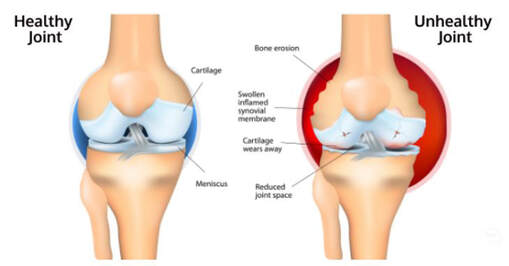|
At this time of year when the weather is cold and damp, you may feel stiff in the morning and so might your dog. So it is timely to talk about Arthritis. Arthritis is a painful, degenerative joint disease that affects about 20% of older dogs. Unfortunately, many of the cases go undiagnosed because owners attribute the subtle changes in the dogs to ‘old age’ or ‘slowing down’. It is a progressive disease that involves the deterioration of joint cartilage. This condition can affect one or more joints and can lead to pain, stiffness, joint swelling, lameness and reduced mobility, all of which can result in a reduced quality of life. Arthritis develops as a result of trauma (injury or overuse), dietary imbalance or deformity (developmental or genetic). Large breed dogs such as the Rottweiler and German Shepherd are particullarly vulnerable during their early development if their diet is not balanced. Obesity can also overload the joints. Cartilage provides cushioning for the joint and joint fluid provides lubrication. If insufficient nutrients are unavailable for repair then cartilage is destroyed and bone spurs form to try and stabilise the joint and this restricts MOVEMENT. Inflammation then develops causing pain and loss of mobility. As the disease progresses there can be additional destruction of cartilage on the bone surface and production of extra bone around the joints. If left untreated arthritis can cause irreversible damage and prevent dogs from fully participating in everyday activities such as walking, running and swimming. Arthritis affects one in five adult dogs and these are just the cases that have been diagnosed. The actual number of dogs suffering from arthritis is unknown, because many dog owners attribute the subtle changes in their pets to ‘old age’ or ‘slowing down’ While many cases occur in older, overweight and larger breed dogs, the disease can affect dogs of all sizes, ages and breeds. With the exception of joint replacement, there’s no cure for degenerative joint disease and arthritis in dogs. However the pain associated with these conditions, and the stiffness and lameness they cause can be managed. Unfortunately, dogs can’t tell their owners if and where they hurt, so it can be difficult to know when your dog is in pain. However, we do know that the physiological mechanism of pain perception is common to both humans and animals, so follow this simple guideline: If you think a health problem with cause you discomfort you can assume it will do the same in your dog. Dogs display a wide variety of responses to pain…
It is important to observe dogs close for the signs of arthritis, including
“Improved tremendously, real impressive, like a puppy again; whole attitude happier” Collen Johnson and Carla a 6yr old shepherd.
“My dog became much more supple and active and playful. Could not believe the difference. I wondered if my pet had been switched overnight with some puppy” Age of pet 6-8 years old. Joint Flex is a comprehensive and balanced formulation of essential nutrients that provide the raw nutrients to support maintenance and repair of the joint. For more information check our website, follow us on Facebook, or phone Chris on 0274985404
0 Comments
|
AuthorChris Piper Archives
November 2021
Categories |








 RSS Feed
RSS Feed